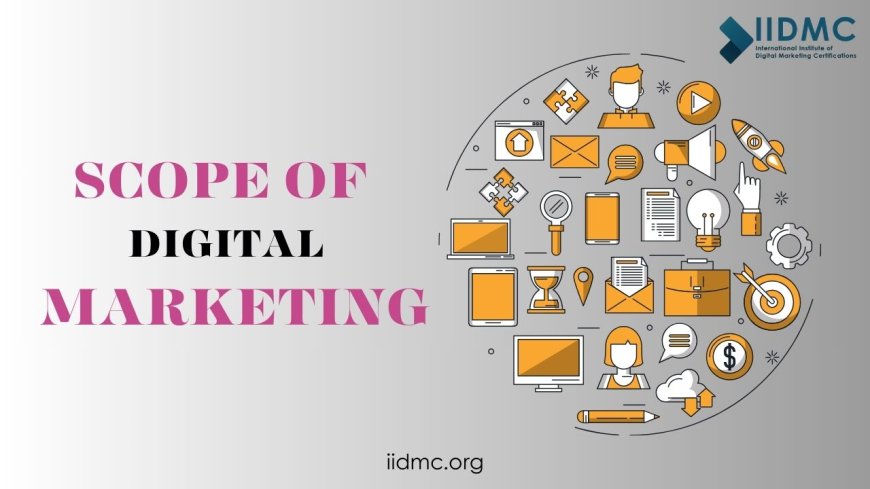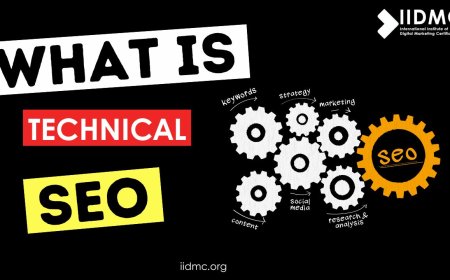Scope of digital marketing
Discover the vast scope of digital marketing, its impact on businesses, career opportunities, and future trends shaping the industry.

Digital advertising, influencer marketing, affiliate marketing, mobile, email marketing, content marketing, social media marketing, analytics, marketing automation, online reputation management, and digital advertising are just a few of the many strategies and tactics that fall under the umbrella of digital marketing. In an increasingly digital environment, it entails using digital platforms and technology to contact, interact with, and convert target audiences to promote company expansion and meet marketing goals.
The field of digital marketing has enormous potential in today's digital environment, and it is crucial for companies of all kinds. Imagine a situation where a new company is trying to make a name for itself in a crowded market. Through the utilization of digital marketing strategies, such as search engine optimization (SEO) to increase search engine visibility, content marketing to interact with the target audience through useful and educational content, social media marketing to establish brand awareness and cultivate relationships with customers, and analytics to assess campaign efficacy, the startup can successfully connect with its target audience, drive traffic to its website, produce leads, and ultimately accomplish its objectives in an economical and quantifiable way.
Challenges in digital marketing
-
Constantly Evolving Environment: Digital marketing platforms, algorithms, and trends change rapidly, making it challenging for marketers to stay updated and adapt their strategies accordingly.
-
Competition and Saturation: With more businesses investing in digital marketing, competition for audience attention and ad space intensifies, making it harder to stand out amidst the noise.
-
Data Privacy Concerns: Increasing concerns about data privacy and regulations (such as GDPR and CCPA) pose challenges for marketers in collecting, storing, and using customer data while maintaining compliance.
-
Ad Blocking: The widespread use of ad blockers limits the reach and effectiveness of digital advertising, forcing marketers to find alternative ways to engage audiences without relying solely on traditional display ads.
-
Content Saturation and Quality: The sheer volume of content produced daily can lead to content saturation, making it difficult for brands to create content that resonates with their target audience and stands out from the competition.
-
Measuring ROI and Attribution: Attribution modeling and accurately measuring the return on investment (ROI) of digital marketing efforts across multiple channels remain challenging due to the complex customer journey and interactions across touchpoints.
Why do companies use digital marketing?
-
Targeted Audience Reach: Digital marketing allows companies to precisely target their audience based on demographics, interests, behaviors, and other factors, ensuring that marketing efforts are directed toward those most likely to be interested in their products or services.
-
Cost-Effectiveness: Compared to traditional marketing channels like print, TV, or radio advertising, digital marketing often requires lower investment while providing a higher return on investment (ROI), making it accessible to businesses of all sizes, including startups and small enterprises.
-
Measurable Results: Digital marketing offers robust analytics and tracking tools that provide real-time insights into the performance of campaigns, allowing companies to measure key metrics such as website traffic, conversion rates, engagement, and more, and make data-driven decisions to optimize their strategies.
-
Flexibility and Adaptability: Digital marketing campaigns can be easily adjusted, scaled, or optimized in real-time based on performance metrics, market trends, or changes in business objectives, offering greater flexibility and agility compared to traditional marketing methods.
-
Brand Awareness and Visibility: Through various digital channels such as search engines, social media, email, and content marketing, companies can increase their brand visibility, reach new audiences, and create awareness about their products or services in an increasingly digital world.
-
Engagement and Interaction: Digital marketing enables companies to engage with their audience in meaningful ways through social media interactions, personalized email campaigns, interactive website content, and more, fostering relationships, building trust, and improving brand loyalty.
Scope of Digital Marketing
-
Search Engine Optimization (SEO): Optimizing websites and content to improve visibility and rank higher in search engine results pages (SERPs) organically.
-
Search Engine Marketing (SEM): Paid advertising on search engines like Google, typically through pay-per-click (PPC) campaigns to increase visibility and drive traffic.
-
Content Marketing: Creating and distributing valuable, relevant content to attract and engage a target audience, to drive profitable customer action.
-
Social Media Marketing: Leveraging social media platforms such as Facebook, Instagram, Twitter, LinkedIn, and others to connect with audiences, build brand awareness, and drive engagement.
-
Email Marketing: Sending targeted emails to subscribers to promote products, services, or offers, nurture leads, and maintain customer relationships.
-
Influencer Marketing: Partnering with influencers or industry experts with a significant following to endorse products or services and reach their audience.
-
Affiliate Marketing: Collaborating with affiliates or partners who promote products or services in exchange for a commission on sales generated through their referral efforts.
-
Digital Advertising: Displaying ads on various digital platforms, including websites, mobile apps, social media, and more, using various formats such as banners, videos, or native ads.
Trending Digital Marketing Concepts
-
Chat-based Marketing: Using messaging apps and chatbots to talk directly with customers in real-time.
-
Video Marketing: Sharing short videos and live streams on social media to catch people's attention.
-
Personalized Ads: Tailoring ads to match what each person likes and does online.
-
Voice Search Optimization: Make sure your website shows up when people ask voice assistants like Siri or Alexa questions.
-
Customer Reviews and Social Posts: Sharing what customers say about your brand on your website and social media.
-
Interactive Content: Making fun quizzes, polls, and games that people can play online.
-
Virtual Try-On and Demos: Letting customers see how products look or work through their phones or computers.
-
Quick, Relevant Content: Sharing helpful info or deals right when people are searching for it online.
Businesses may connect and interact with their target audience online with the help of digital marketing, a potent instrument. It includes several techniques, including email campaigns, social media marketing, SEO, and more. It has numerous advantages, such as accurate targeting and quantifiable outcomes, but it also has drawbacks, such as the need to keep up with trends and contend with competition. In the current digital era, digital marketing generally aids companies in connecting with consumers, increasing brand recognition, and achieving their marketing objectives.




























